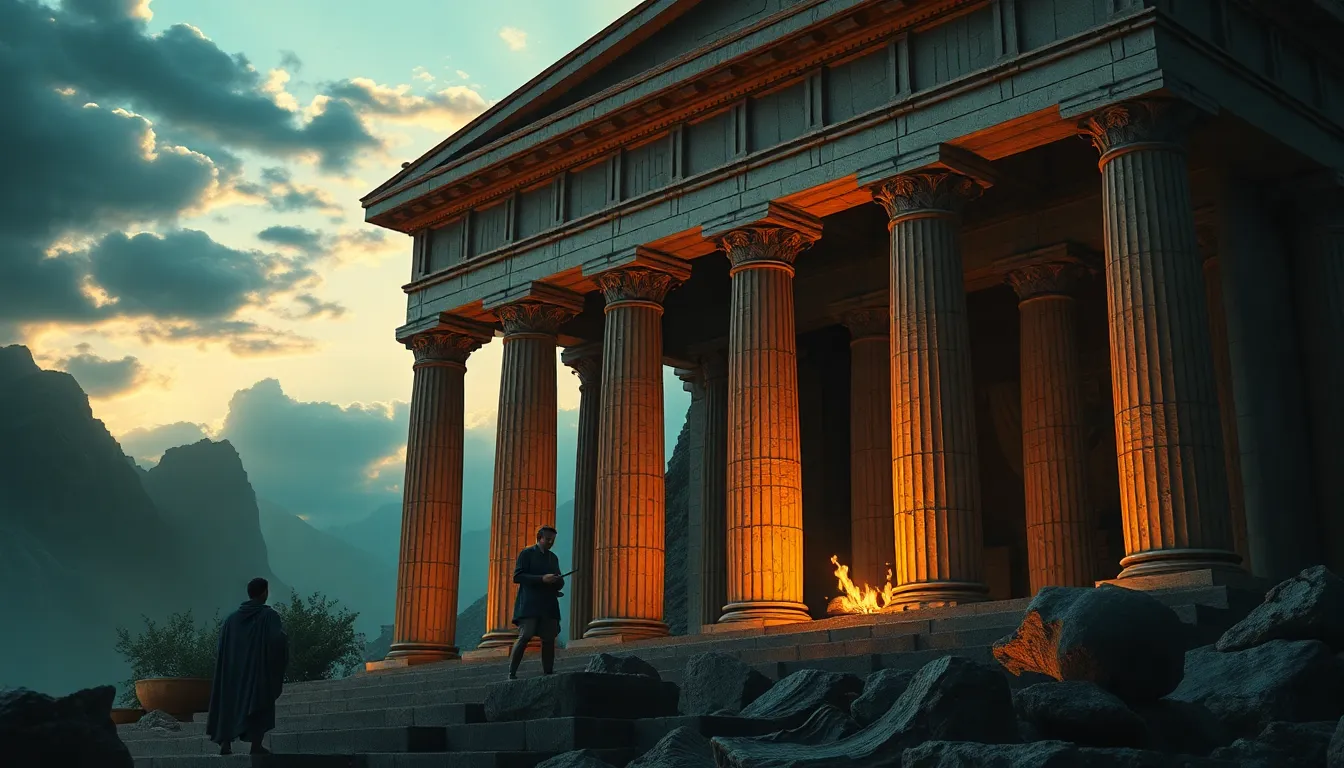The Myths Surrounding the Birth of the Gods in the Greek Pantheon
I. Introduction
Greek mythology is a rich tapestry of stories that have shaped ancient and modern cultures alike. It serves not only as a reflection of the values and beliefs of the ancient Greeks but also as a foundation for Western literature, philosophy, and art. The myths surrounding the birth of the gods are particularly significant as they outline the origins of divine beings and the cosmos they inhabit.
This article aims to dispel common myths about the birth of the gods, delving into the fascinating tales of creation that form the backbone of Greek mythology.
II. The Primordial Deities: Chaos and the Genesis of the Universe
At the beginning of all things in Greek mythology was Chaos, a primordial void that existed before anything else. Chaos is often depicted as a dark, empty space, representing the chaos of the universe before creation.
From this void emerged the first deities, including:
- Gaia: The personification of the Earth, she is often seen as the mother of all life.
- Tartarus: The abyss that lies beneath the Underworld, representing the deepest part of the Earth.
- Eros: The god of love, sometimes considered as the force that brings order out of chaos.
These primordial beings laid the foundation for the universe and the gods that would follow.
III. The Titans: Birth of the First Divine Generation
The next generation of divine beings came from the union of Gaia and Uranus, the sky. Together, they produced the Titans, who would become the first ruling deities of the Greek pantheon.
The lineage of the Titans includes:
- Cronus: The leader of the Titans, known for his role in the overthrow of Uranus.
- Rhea: The sister and wife of Cronus, she is the mother of the Olympian gods.
- Oceanus: The Titan of the ocean, representing the vastness of the sea.
- Hyperion: The Titan of light, often associated with the sun.
These Titans held significant roles in mythology, often representing various aspects of the natural world and human experience.
IV. The Olympian Gods: From Titans to the Next Generation
The Olympians emerged as the new ruling gods after the overthrow of the Titans in a legendary conflict known as the Titanomachy. Led by Zeus, the Olympians defeated Cronus and his allies, securing their place in the heavens.
Key birth stories of major Olympian gods include:
- Zeus: Born to Rhea, he was hidden away from Cronus, who swallowed his other children to prevent them from overthrowing him.
- Hera: Also a child of Rhea and Cronus, she became the queen of the gods and goddess of marriage.
- Poseidon: The brother of Zeus, born and later associated with the sea.
- Hades: The god of the Underworld, who was also swallowed by Cronus but later rescued by Zeus.
These stories illustrate the complex relationships and dynamics among the gods, setting the stage for many of the myths that would follow.
V. Myths of Birth and Creation: Variations and Interpretations
Across ancient texts, there are various versions of birth myths, reflecting the diverse beliefs and storytelling traditions of the Greeks. Notable sources include Hesiod’s “Theogony” and Homer’s “Iliad,” which provide different perspectives on the origins of the gods.
Oracles and prophecies played a crucial role in shaping these narratives, often influencing the actions of gods and mortals alike. The unpredictability of fate and divine will is a recurring theme in these stories.
VI. Symbolism and Themes in the Birth of the Gods
The births of key deities are imbued with symbolic meanings that resonate throughout Greek mythology. For instance:
- Chaos to Order: The transition from chaos to the structured pantheon reflects the Greeks’ understanding of the universe’s order.
- Power Dynamics: The overthrow of the Titans by the Olympians symbolizes the passage of power and the cycles of generations.
- Creation and Destruction: Many myths highlight the dual nature of creation, as seen in the birth and death of gods and titans.
These themes provide insight into the ancient Greek worldview and the complexities of their mythos.
VII. Common Misconceptions About the Birth of the Gods
Despite the richness of Greek mythology, several misconceptions abound regarding the birth of the gods. Some common misunderstandings include:
- The idea that all gods were born from Chaos, ignoring the roles of Titans and primordial deities.
- Confusing the relationships between the gods, particularly their parentage and marriages.
- The belief that myths are static; in reality, they evolved over time and varied by region.
Modern interpretations, often simplified or altered for contemporary audiences, can further distort these ancient narratives, leading to misunderstandings about their original meanings.
VIII. Conclusion
Understanding the myths surrounding the birth of the gods is essential for appreciating the complexities of Greek mythology. These stories not only reflect the ancient Greeks’ beliefs but also offer timeless themes of chaos, order, and the nature of power.
As we explore these myths, we uncover the intricate web of relationships and narratives that continue to influence our culture today. We encourage readers to delve deeper into the world of Greek mythology, discovering the layers of meaning and the rich history that these tales embody.




